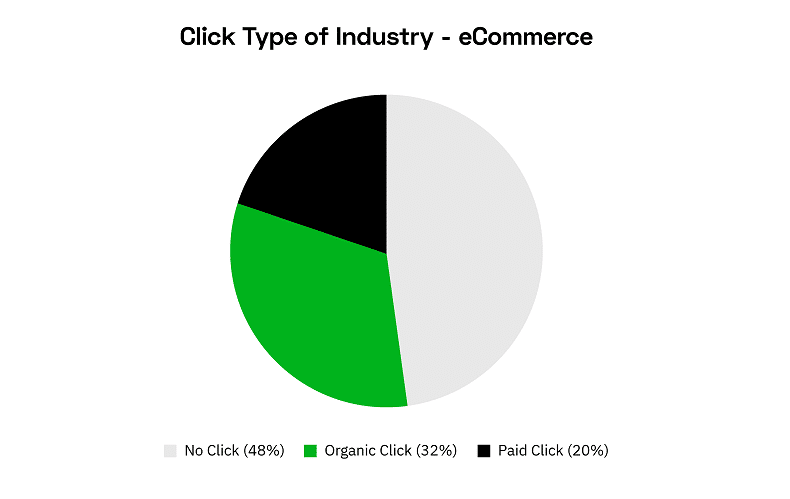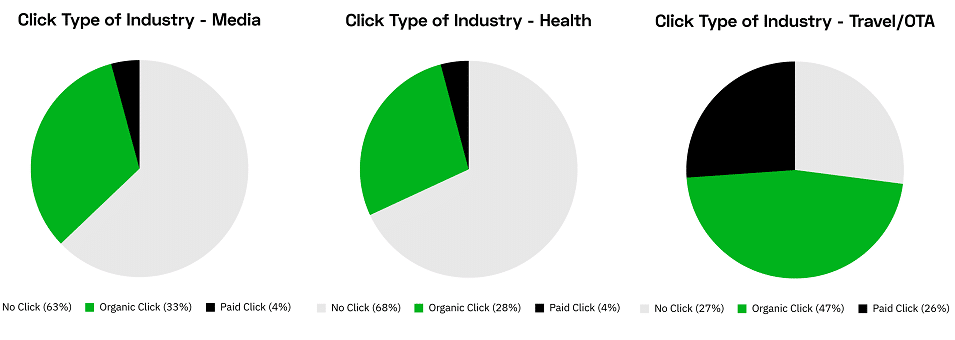
The findings, from Searchmetrics, tie-in with retailers who are not seeing the same volume of traffic from organic search as before.
Searchmetrics analysed clickstream data in the US for approximately 1 million typical ecommerce search queries as part of a bigger study that also covered the travel, healthcare, and media verticals.
In ecommerce, the company found that only 32% of searches resulted in organic clicks, while 20% triggered paid clicks either through search ads or Product Listing Ads (PLAs). The remaining 48% of searches produced no clicks at all, meaning there was no traffic generated to retail sites.
According to Searchmetrics, some of the no-click activity could simply be down to searchers not finding what they are looking for from an initial query and then searching again using a more refined question. But the main reason for the high number of missing clicks is the increasing number of SERP features (also known as SERP integrations) such as Featured Snippets, Direct Answers, Knowledge Panels, People also Ask and Videos Carousels, that Google now includes on search results pages.
Google has been increasing the use of SERP integrations to answer searchers’ questions within the SERP and to control the user experience. This is creating a growing challenge for online marketeers.
Featured Snippets, for example, are used by Google to provide short answers to searchers’ queries in a widget box positioned above the organic search results. The box displays the key text and images from a relevant web result that answers the searcher’s question. There’s also a link to the original web page that searchers can click to view the full information, but in many cases – because the question has already been answered in the widget – people never bother to click through.
Similarly, Direct Answer boxes deliver information within the SERPs in response to fact-based search queries. In this case, the information comes from Google’s Knowledge Graph, a knowledge base of information about things, people and places that has been pulled together from trusted sources such as Wikipedia and other high quality websites. With Direct Answers, there is no link included to the external website where content originates.
According to Tyson Stockton, Vice President of Client Services at Searchmetrics, the increasing number of SERP features and the resulting no-click activity is both a threat and an opportunity: “It’s a threat as more retailers are reporting diminishing levels of organic traffic. Many small to mid-sized sites in retail are getting squeezed out by SERP features – but giants like Amazon will also be challenged. However, SERP integrations can also be an opportunity for online retailers to increase brand awareness – especially on top funnel terms or early stage queries in the buying cycle. There are opportunities for websites, both large and small, to directly answer searchers’ questions in a structured format that’s easy for Google to integrate into the SERP.
“For example if you have created content that triggers a Featured Snippet result for a search such as ‘top 10 running shoes’, maybe you don’t get the click from that query but searchers see your list of running shoes on the SERP so you can still get awareness, credibility and branding.”
Tyson advises retailers to focus on understanding which SERP features are present in their segment and to be more strategic about where and how they are competing in search. He suggests they should be more selective when targeting keywords, by focusing on keywords that might have slightly low search volume but high organic click-through rate to capture more traffic than just focusing on the keywords that have the highest search volume. This is especially true for retailers’ top funnel and editorial content.
“Keep evolving your strategy to compete on strategic keywords that drive the most value,” Stockton said.

In its wider analysis, Searchmetrics found that in the media vertical 63% of relevant search queries produce no organic clicks.
“The likelihood here is that people are searching, reading headlines in the SERP and then searching on other news topics without ever clicking to the online publications – depriving them of traffic and potential ad revenue. This is challenging for publishers and further increases the use of click-bait headlines.”
In the healthcare sector no-click activity accounted for 68% of all searches – the highest of all the verticals that were analysed. The likelihood is that Google is answering those clear, straightforward medical questions that people have directly on the page with various SERP features. This adds another level of complexity to ranking highly and driving traffic for health keywords according to Stockton.
In the travel industry no-click searches were about 27% of the total. However, the analysis focused primarily on online travel agents and related queries, rather than flight related queries that would trigger Google flights and other SERP integrations that answer questions within the SERPS.
